Daily Life in North Korea
Citizens of North Korea are taught through the Juche ideology based on Kim II Sung’s supremacy that their lives are nurtured and legitimized by the leadership of the Kim dynasty. This ideological manipulation alters the individual identities of North Koreans and steals the citizens’ own sense of self, leaving nothing but a mere echo of rights or freedom.
Even though laws and regulations exist in the North Korea, citizens are forced to obey the “The Workers’ Party’s Ten Principles of the Establishment of a Unitary Ideology System”. The North Korean people are forced to memorize these principals and regard them as the standard by which they must live their lives. As these principles form the basis of everything in society, people can neither be skeptical of the state nor start efforts to make a change as criticizing the state is seen as a crime for which one’s entire family can be punished. To protect family and friends back in North Korea, our defectors’ stories must remain anonymous and last names will not be published.
“No one chooses to be born in North Korea.” – Kyu-Min (defected in 1999)
North Korea is the world’s most secretive state and it can be difficult to get a clear picture of the daily lives of its 25 millions citizens. Visits to the country are strictly limited and closely monitored. Statistics provided by the government are often inflated or deflated for the government’s convenience. One way to learn about the reality of North Korea is to ask those who managed to escape the struggles North Koreans face every day. The lack of essential goods, false imprisonment, forced labor, and propaganda are reasons why 30,208 people in total, and around 1,414 people in the year 2016 alone, risked their lives to escape despite the perilous journey through China and East Asia.
![Life in North Korea 1 “It is better not to know what love is, because it becomes difficult to criticize people you love and empathize with. We criticized our friends every week. When a friend commits a mistake in North Korea, rather than meeting him or her privately to talk about it, it is better to publicly criticize them to set an example for others. [This is called] Saenghwalchonghwa(“the meeting for self-criticism and criticism of others”)](https://pscore.org/wp-content/uploads/elementor/thumbs/Faceless-OC-English-Slide-1-r7ilxc3wrh7qbwt5khdxbjzxflrnigixs2e8p6sz9q.png)
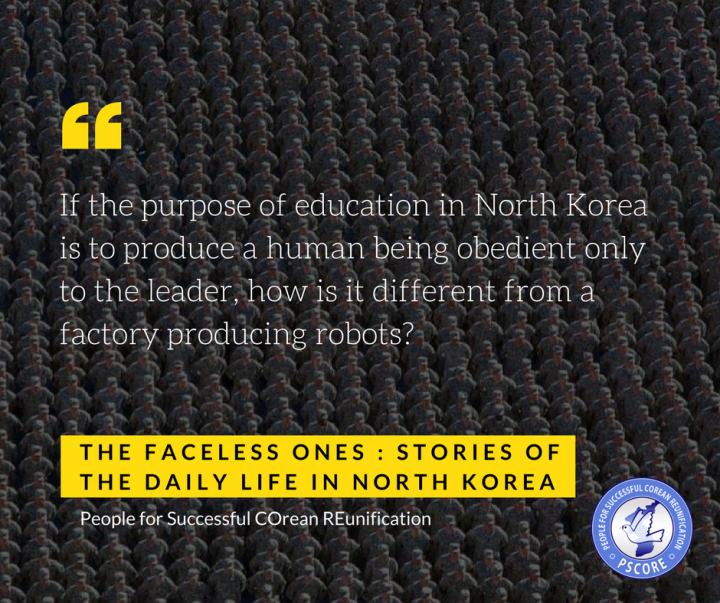
![Life in North Korea 3 “She had three sons. [...] The younger they are the harder it is for them to endure hunger. The youngest son soon became malnourished and passed away. The second son soon followed. Since there isn’t anything to eat in North Korea, we eat what we can get. We eat roots or anything chewable we find on the streets. [...] I also lost a child, so I know how [the mother] felt. Since my child was not able to get proper medical attention, he became sick at a young age and passed away. I did everything in my power to not let my child starve but it was impossible. He became sick because I couldn’t provide the proper nutrition.](https://pscore.org/wp-content/uploads/elementor/thumbs/Faceless-OC-English-Slide-5-r7ilxzlvic3we5v0r9jljw2ga8jtuw487apdp3u4y6.png)
![Life in North Korea 4 “There was no point in working hard since the Party took most of it. [...] We were only able to maintain our lives by receiving rations. [...] I wanted to leave North Korea so badly [...] I was repatriated several times after being caught by the Chinese police. [...] The third time I put a pin inside my belt in order to commit suicide in case I got caught again. The guards saw me put a pin in my mouth and came running to grab me. One of the female guards places her fingers in my mouth [...] I bit her. My lips and her fingers were bloody [...] Two days after that happened, twenty two defectors, including me, were put on a bus. The female guards whose finger I bit came to me and said “I understand why you did it. You don’t want to go back to that place”.](https://pscore.org/wp-content/uploads/elementor/thumbs/Faceless-OC-English-Slide-9-r7ilz333hdlxxs9ocqlxgm3t8f58u6gycq3ruq7lou.png)
![Life in North Korea 5 “In North Korea, [...] you cannot practice religion. It is not about believing in God or not. It is because religion would show the glaring contradictions in North Korea’s ideology”.](https://pscore.org/wp-content/uploads/elementor/thumbs/Faceless-OC-English-Slide-11-r7ilwkul9a6ez7wqznlqt8vk7fi0b8iq0bh5s5xea6.png)
![Life in North Korea 6 “Every generations of a family must serve the Chief commander - if a previous generation commits a crime, then the next generation in punished as well."
Eun-Jung : I was told my grandfather had fled to the South. However, my grandfather did not flee to the South. He simply went missing. Because he liked to drink, there were times when he did not come home. And, one day, he simply went missing. [...] My grandfather could have easily been in an accident after drinking, but nevertheless, my family was involved in his crime through the guilt by association system and were imprisoned in a concentration camp for three generations. I was 13 years old when I was imprisoned for 28 years.](https://pscore.org/wp-content/uploads/elementor/thumbs/Faceless-OC-English-Slide-13-r7ilwh38hy19os27llz8j9tptw0jgg3snsv7v22yz2.png)
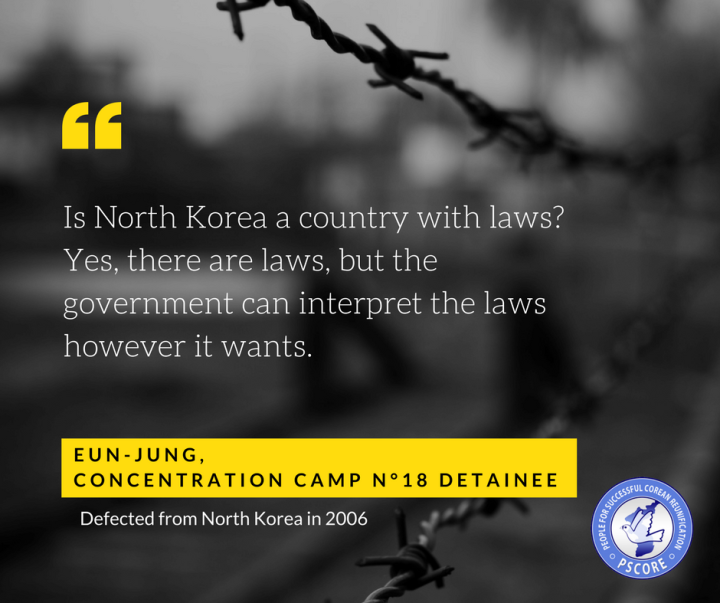
![Life in North Korea 8 "When I was imprisoned, [...] I saw people die everyday due to starvation, harsh treatment, and diseases. [...] When things were bad, 2 or 3 people died each day. When a person dies there is no time to grieve for that person. Everyone must weed 12 454 square-feet and sow 10 674 square-feet each day. If you don’t do that, you cannot eat anything that day. So, even if a person dies right next to you, you do not have time to look after them.”](https://pscore.org/wp-content/uploads/elementor/thumbs/Faceless-OC-English-Slide-19-r7im1eqqdmsgn2w5s8rq4izu3powv8p2c85zkcrkb2.png)
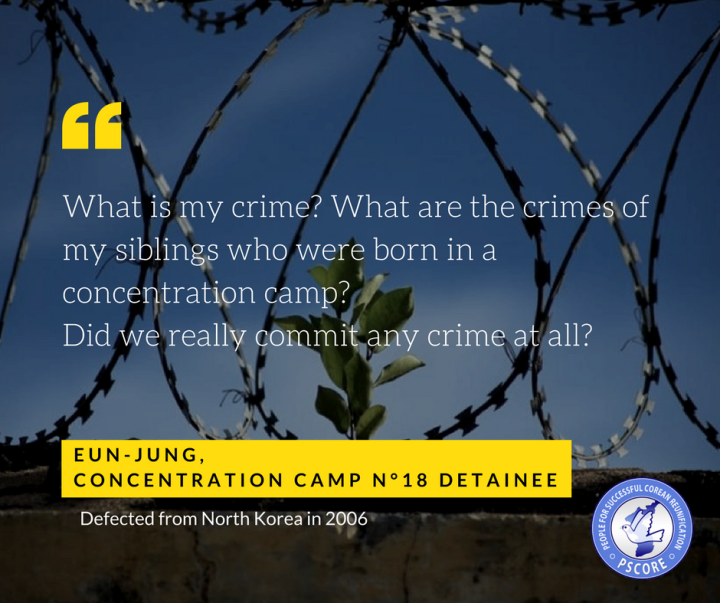
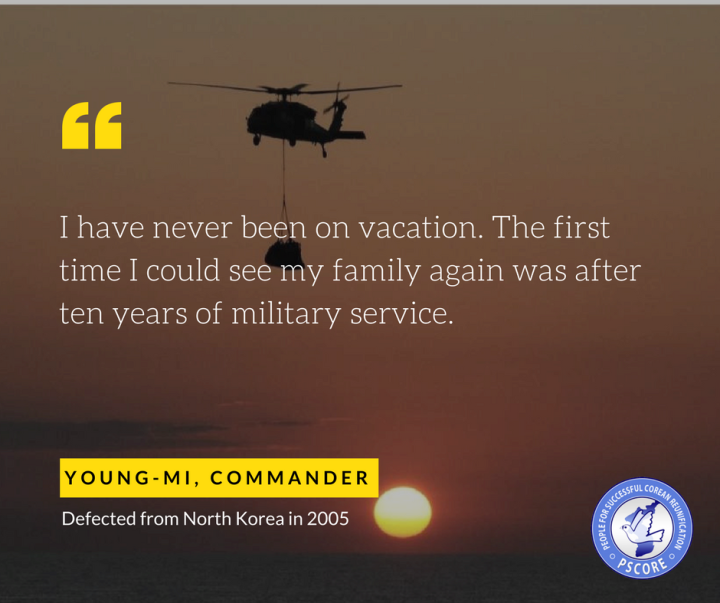
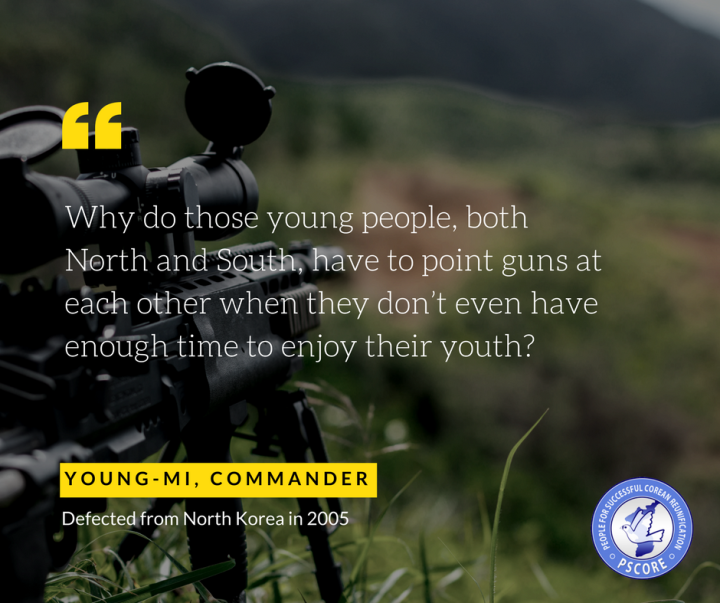
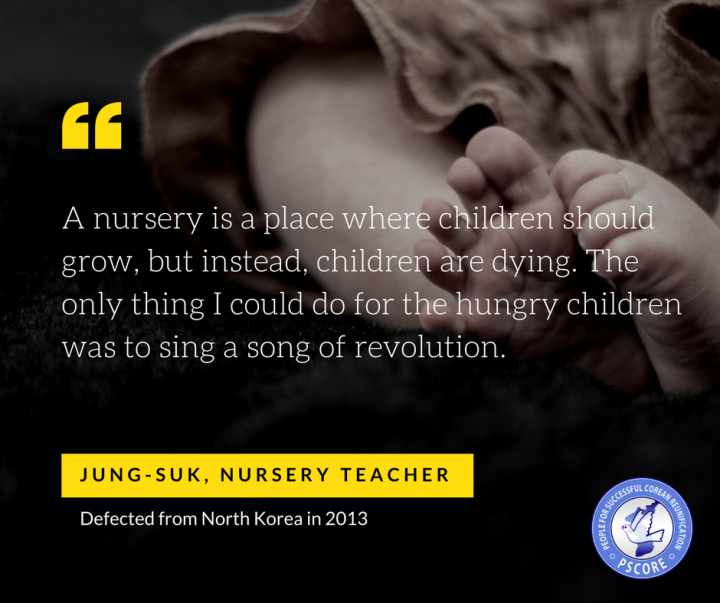
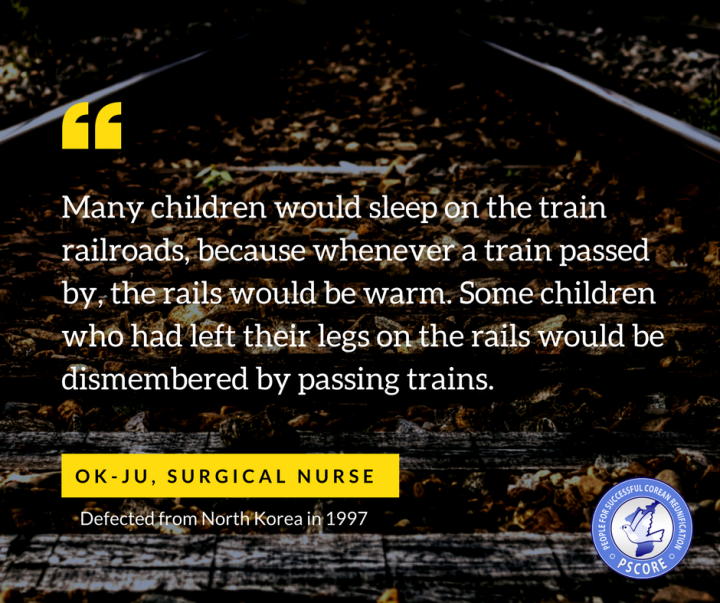
The Lack of Essential Goods
The Lack of Essential Goods
“We were barely given any money or rations from work and we were always hungry.” – Ah-Young, textile factory worker
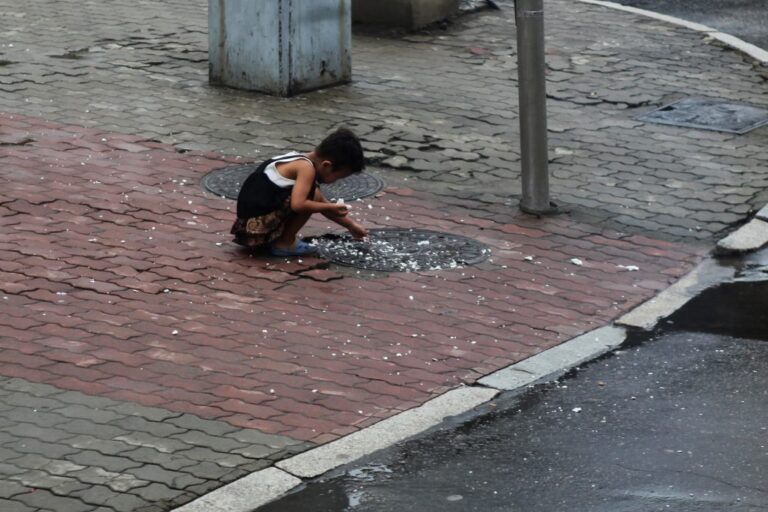
One of the major issues in North Korea is the consistent famine and malnutrition. There are two ways North Koreans can acquire food: through the small legal or black markets, or through government-provided rations. According to the World Food Program, the North Korean government distributed 400g daily per person in January of 2017. In further cuts in January 2019 due to crop shortages, food rations were decreased to just 300g per person per day. This amounts to only 50% of the UN-recommended 600g daily per person.
During Covid the food shortage has worsened, where the North Korean Government has implemented strict olicies on its border, while also severely restricting residents movement. In fact, many sources confirmed that for North Koreans, the food restrictions caused by COVID-19 are a bigger danger than the virus itself.
North Koreans are regularly the victims of floods and droughts, with the last flood in 2018 killing 76 people and displacing thousands. The government is unequipped to cope with the impacts of natural disasters, as can be seen most clearly in the steady decrease in food storages. During the “Arduous March”, a propaganda idiom for the time from 1994 to 1998 where North Korea suffered from extreme famine, around one million people died from starvation. Children are usually the first victims of malnutrition, and North Korea has a child mortality rate ten times higher than South Korea.
“Since there isn’t anything to eat in North Korea, we eat everything we can get. We eat roots and anything that is chewable […] There was a mother who entrusted the nursery with her three kids. But all three starved to death” – Jung Suk, nursery nurse (defected in 2013).
”Because there were no medications and insufficient instruments, there was nothing I could do as a doctor. Even the locals stopped searching for a doctor.” – Chui-Min, General Practitioner (defected in 2005)
As medicine in hospitals are usually too expensive, sick North Koreans head to the Jangmadang, the black markets, to buy the medicine that they can find. They typically treat themselves at home. In hospitals, instruments are generally outdated and unsafe due to poor maintenance and unstable power conditions.
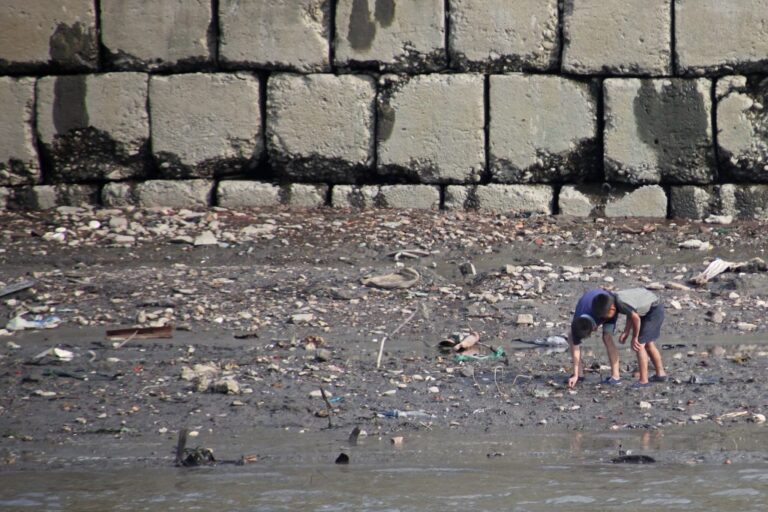
Unstable power conditions also make it difficult to stay warm during the winter, even in the elite apartments in Pyongyang. Outside of the capital, North Koreans usually burn coal to stay warm, putting themselves at risk for respiratory problems. In winter, temperatures can fall to -13°C (8.5F) during the day. “Many children would sleep on the train railroads, because whenever a train passed by, the rails would be warm. Some children who had left their legs on the rails would be dismembered by passing trains” – Ok-Ju, surgical nurse (defected in 1997).
False Imprisonment
False Imprisonment
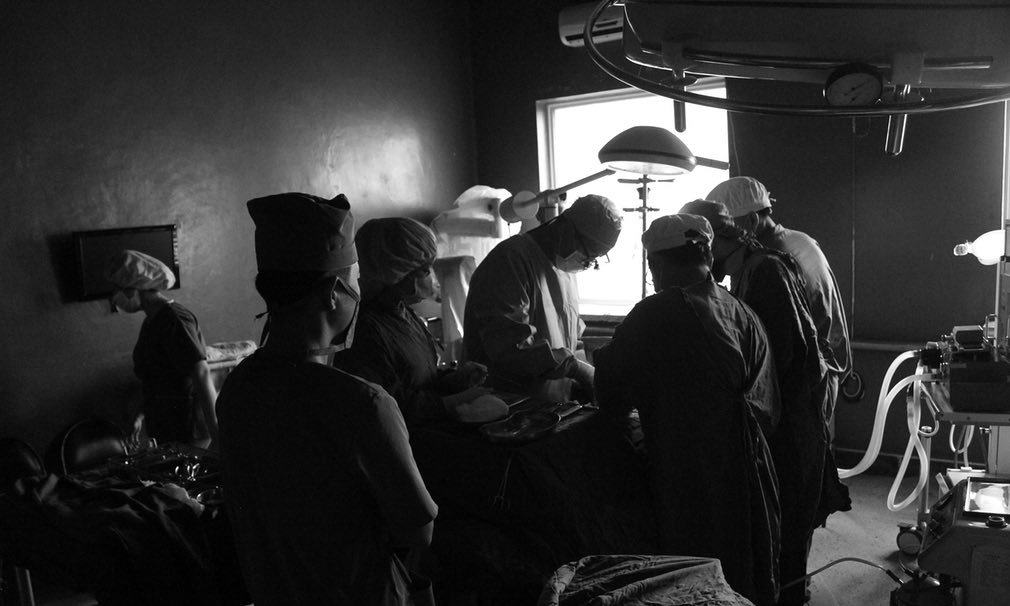
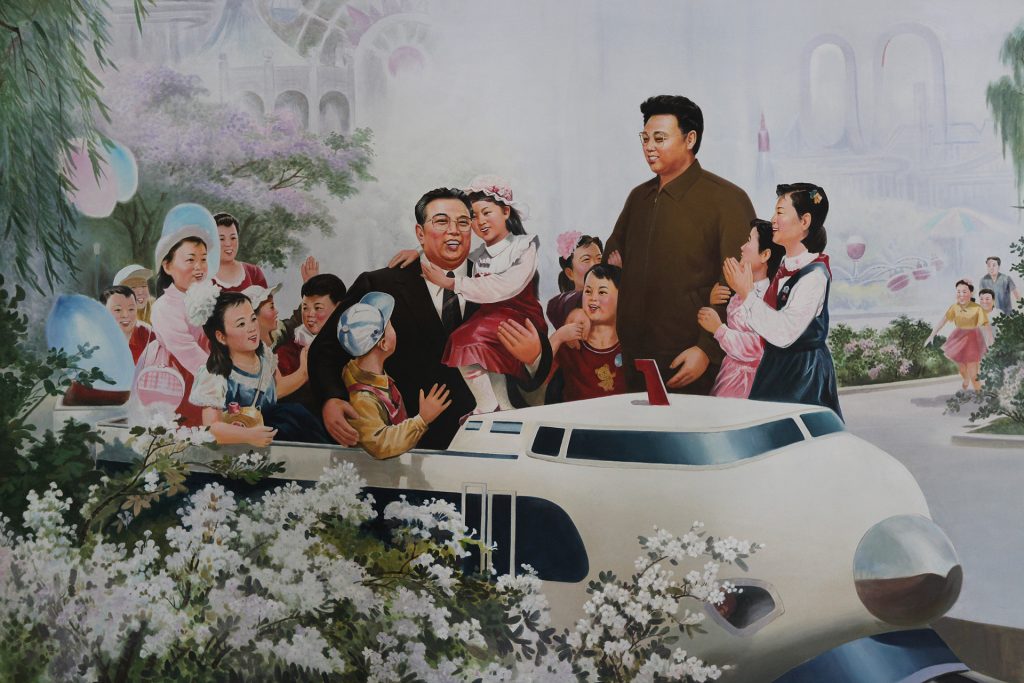
North Korean men are also required to enlist in the army for a minimum of ten years, during which they hardly get any vacation days. North Koreans are taught to hate the external world, especially the United States and South Korea, as their “main enemies”.
”In North Korea, one should not try to act based on what they think but instead, one should act how a person is supposed to act. For instance, when talking about America, one should always be mad.” – Kyn-Min, movie director (defected in 1999)
This helps create a sense of patriotism and assures the North Korean citizens’ eternal affection for the Kim family, who they see as protectors.
In practice camp No. 18 the relatives of perpetrators are imprisoned in accordance with the “guilt by association” system. In North Korea, one can be punished for a crime one did not commit; “guilt by association” means relatives to the offender, up to three generations, will be imprisoned as well. Children are born and raised in camps because their parents are imprisoned for a crime their grandparents committed, and often, they do not know why. It is a powerful form of coercion for those who wish to escape to South Korea as they know their families will pay the price.
”A diplomat cannot take his entire family with him when he goes abroad. Some members have to be left in Korea, essentially, as hostages.” – Yeong-Geon, diplomat (defected in 2012)
”Serious offenders are sent to camp No. 25, a place you cannot exit alive.” – Min-Chul (former detainee of camp No. 15)
The exact population of the camp is the subject of discussions. Some scholars say it is a camp for political offenders only, others for felons, religious leaders and members of factions. Min-Chul, one of the defectors who agreed to talk to us about his experience in the camps, recalls the case of a railroad employee who distributed bibles from China in his town.
”I remember the night he got his final sentence. He had a very comfortable smile when he said ‘I was sentenced to 15 years in Su-Sung concentration camp [camp No. 25]’ […] Even when he was being dragged out of the jail, he sang hymns. I cannot forget this scene”.
Propaganda
Forced Labor
North Koreans are taught to idolize the Kim family and fight for their country from an early age. The education system is designed around this purpose.
Propaganda is at every corner, and in every aspects of one’s life : movies, television shows, theater, comic books, posters in the street… North Koreans are required to visit monuments to honor Kim Il-Sung and Kim Jong-Il several times a months and have framed pictures of their “beloved leaders” in their homes that they are required to clean every day.
Since Kim-Jong-Un's Reign, the control over freedom of thought, expression and religion has become increasingly controlled. Life review and learning sessions are increasing and the worshiping of the leaders is said to become more and more ideological.
Alongside with that, the censorship is growing stronger. The internet freedom is strongly compromised. The punishment over consumption of foreign materials, such as TV broadcasts has strongly increased during the last few years, reaching up to 10 years of edification nowadays. Those caught owning or distributing Korean media, can face punishments such as life imprisonment or even death penalty.
That being said, a lot of North Koreans still yearn information from outside, it is estimated that around 8% of the North Korean population listens to foreign radio broadcasts at least once a week.
Forced Labor
As most of them don’t have the background and money sufficient to go to the university after they graduate from high school, North Koreans are sent to work on collective farms, factories, construction sites, etc. They do not get to choose their job, and are submitted to intense hours of work, up to 12 or 16 hours per day.
”I had to stand up all day. In six years both my legs’ joints were broken so I had to stay in a hospital. I was glad, because it meant I could finally rest.” – Ah-Young, textile factory worker (defected in 2009)
In exchange for their work, they receive little pay and food. In collective farms, for instance, each worker is given a quota per day, and when the quota is not met, the worker does not get anything to eat. Working on construction sites and in mines can be dangerous, but if injured, the North Koreans do not receive any compensation.
Escape
Escape
But even if they successfully managed to cross the border, North Korean defectors are often not safe. China defines the crossing of the North-Korean-Chinese-border as an illegal activity, repatriating defectors, if found. Often, they have to live in hiding, which is dangerous, especially for women, who often face sexual violence and are in danger of human trafficking, often being sold to Chinese men into forced marriages.
Finally, they must travel through China and Laos to reach Thailand, where they can ask for asylum at the South Korean embassy. After long checks and interrogations, defectors are given the South Korean nationality and can finally begin their new life.
All testimonies are drawn from “The Faceless Ones : Story of North Korean Ineluctable Defects”, a report from PSCORE (2015). If you would like to support PSCORE in its actions for defectors, consider buying the book here. You can also help here.
If you want to learn more about the current human rights situation in the DPRK you can read our review of the COI report 10 years later here.
